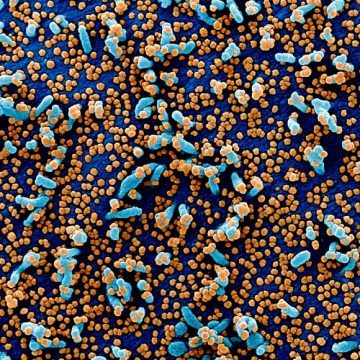From Science News:
 EIDD-2801 is an orally available form of the antiviral compound EIDD-1931 (β-D-N4-hydroxycytidine). It can be taken as a pill and can be properly absorbed to travel to the lungs. When given as a treatment 12 or 24 hours after infection has begun, EIDD-2801 can reduce the degree of lung damage and weight loss in mice. This window of opportunity is expected to be longer in humans, because the period between coronavirus disease onset and death is generally extended in humans compared to mice. “This new drug not only has high potential for treating COVID-19 patients, but also appears effective for the treatment of other serious coronavirus infections,” said study senior author Professor Ralph Baric, a virologist at the University of North Carolina at Chapel Hill.
EIDD-2801 is an orally available form of the antiviral compound EIDD-1931 (β-D-N4-hydroxycytidine). It can be taken as a pill and can be properly absorbed to travel to the lungs. When given as a treatment 12 or 24 hours after infection has begun, EIDD-2801 can reduce the degree of lung damage and weight loss in mice. This window of opportunity is expected to be longer in humans, because the period between coronavirus disease onset and death is generally extended in humans compared to mice. “This new drug not only has high potential for treating COVID-19 patients, but also appears effective for the treatment of other serious coronavirus infections,” said study senior author Professor Ralph Baric, a virologist at the University of North Carolina at Chapel Hill.
Compared with other potential COVID-19 treatments that must be administered intravenously, EIDD-2801 can be delivered by mouth as a pill. In addition to ease of treatment, this offers a potential advantage for treating less-ill patients or for prophylaxis — for example, in a nursing home where many people have been exposed but are not yet sick. “We are amazed at the ability of EIDD-1931 and EIDD-2801 to inhibit all tested coronaviruses and the potential for oral treatment of COVID-19,” said study co-author Dr. Andrea Pruijssers, an antiviral scientist at the Vanderbilt University Medical Center.
In 2019, the researchers reported that EIDD-1931 blocked the replication of a broad spectrum of coronaviruses. They also performed the preclinical development of remdesivir, another antiviral drug currently in clinical trials of patients with COVID-19. In the new study, they demonstrated that viruses that show resistance to remdesivir experience higher inhibition from EIDD-1931. “Viruses that carry remdesivir resistance mutations are actually more susceptible to EIDD-1931 and vice versa, suggesting that the two drugs could be combined for greater efficacy and to prevent the emergence of resistance,” said study co-author Dr. George Painter, from Emory University and the Drug Innovation Ventures at Emory (DRIVE).
More here.
